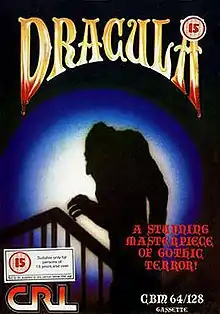| Dracula | |
|---|---|
 | |
| Publisher(s) | CRL Group |
| Designer(s) | Rod Pike Ian Ellery |
| Platform(s) | Amstrad CPC, Commodore 64, ZX Spectrum |
| Release | 1986 |
| Genre(s) | Interactive fiction |
| Mode(s) | Single-player |
Dracula is a text adventure game by CRL released in 1986 for the Commodore 64, Amstrad CPC, and ZX Spectrum home computers. The game is based on the novel Dracula by Bram Stoker. It was the first video game to be rated by the BBFC. The game received a 15 certificate.[1]
Plot
An English lawyer travels to Carpathia to meet Count Dracula regarding a routine property transaction, but soon learns that his client has sinister ulterior intentions.
Gameplay
The game is a standard text adventure with static graphics in some locations. It is divided into three parts:
- "First Night" - The young solicitor arrives in Count Dracula's country, staying at the Golden Krone Hotel; strange events are observed
- "The Arrival" - After an eventful journey, he arrives at Dracula's castle, and soon learns the real nature of his host's intentions; he realizes that he must escape if he is to survive...
- "The Hunt" - A psychiatrist at an insane asylum in England receives a strange letter from a friend on business overseas, warning of "boxes of earth" and the "undead"; meanwhile a patient at the asylum grows increasingly disturbed...[2]
Reception
The game received a "15" certificate from the British Board of Film Censors because of the gory images it contains.[3] However, CRL expressed disappointment with this as they had hoped for an "18" certificate.[4]
Legacy
CRL followed Dracula with three further adventures of a similar style, Frankenstein, Jack the Ripper and Wolfman, all of which also received BBFC ratings.[5]
References
- ↑ Reed, Kristan (26 October 2007). "Bram Stoker's Dracula Review • Reviews • Retro •". Eurogamer.net. Retrieved 10 March 2014.
- ↑ Game manual
- ↑ BBFC rating of Dracula Archived 6 November 2010 at the Wayback Machine
- ↑ "Censored", Sinclair User, December 1986
- ↑ "Dracula unbound: The story behind the first 18 certificated video game". Eurogamer. March 2015.